23rd October 2020 – Video calls have taken over our lives.
Are you suffering from meeting overload?
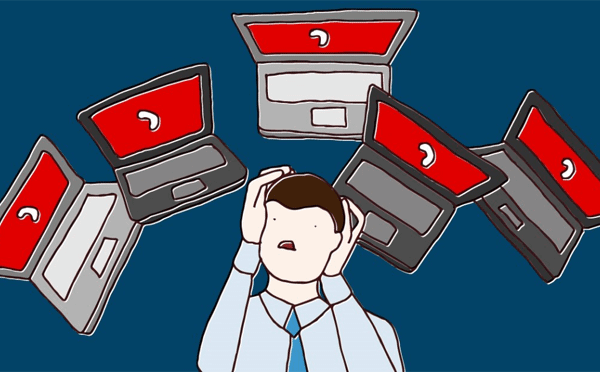

23rd October 2020 – Video calls have taken over our lives.

8th October 2020 – We are all under pressure right now. The ongoing COVID crisis, the deepening recession, our inability to plan for the future, these challenges have all created a cocktail of unease.
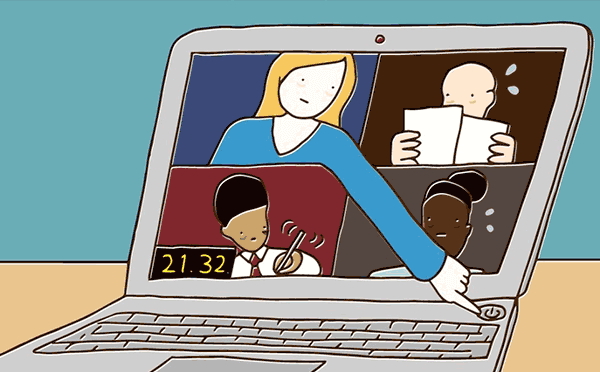
This might not seem much of an achievement but I really struggle to take holidays. I love my job, and I am completely focused on building BigChange and improving the service we offer customers.
Sometimes, though, this makes it hard to switch off. Being ‘on’ all the time can be mentally draining. Recently, I’ve started looking at my packed calendar and I’ve felt overwhelmed, rather than energized.
You need to take breaks in order to recharge. I am always encouraging my colleagues to take holidays and have a rest but it’s hard to take my own medicine.
The COVID-19 outbreak has forced many of us to work from home. Leaders feared that this would adversely affect productivity: would staff be able to manage their time well? How do workers perform when there’s no one watching?
According to the Office for National Statistics, there was only a slight dip in productivity at the start of lockdown – down just 0.4% compared with the same period in 2019. Considering the level of disruption and upheaval, that’s a pretty incredible result.
Now that we truly understand that virtual working can be just as productive as an office-based environment, we must deal with another issue: people who are engaged, driven and ambitious will struggle to stop working.
A recent survey of more than 2,000 people by LinkedIn and the Mental Health Foundation found that Brits who have been working from home since the coronavirus outbreak have been putting in an extra 28 hours of overtime a month. This has taken its toll: more than half (56%) said that they felt “more anxious and stressed” about work than they did before the pandemic. Right now, 12% of workers are logging on before 7am and 18% are still working 12 hours later.
I’ve also noticed that my working day is creeping later and later. The time and energy I’m saving on travelling means I get an extra half hour in bed in the morning, but then I never take a lunch break and find myself still working at 11pm. I’m so much more productive at home and I have a PA yet I’m putting in extra hours. It shouldn’t be this way.
Strong managers will need to ensure that they enforce boundaries, and don’t allow team members to burn out by working long hours. But I am my own manager, and I need to take responsibility for my own mental health.
My wife and I both need to be mindful of ‘burn out’. When I told Mandy I’d booked two weeks off for us to take a holiday she said, ‘I refuse. You go. I’ll work!’ We are a pair of workaholics.
I’m hoping to win Mandy over by finding somewhere really brilliant to go. I don’t want to fly anywhere – I want to help support the British economy by having a ‘staycation’ instead.
I hope some of you reading this can help me out. Where shall we go? We like walking, golf, and we would love to take our dog with us – otherwise we’re open to ideas. We want to keep maintaining social distance, so we will need our own space – and I doubt I could convince Mandy and the kids to go camping.
Make sure you get a holiday in the diary too. I’m sure you need a break as badly as we do.
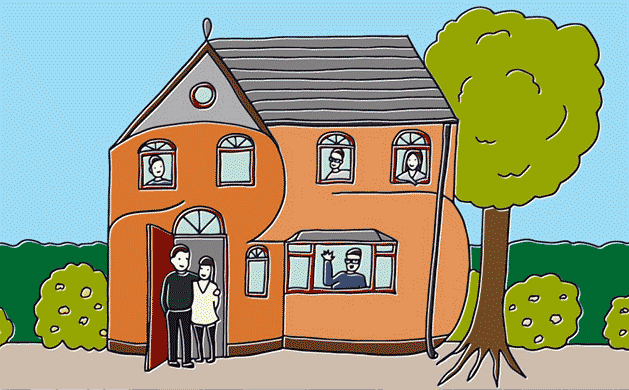
What’s also strange is that I’m not at all sad that things have worked out this way. If the last few months under lockdown have taught me anything, it is to appreciate the little things – and that family is extraordinarily precious.
If you would have told me, at the start of the year, that I would be spending four months inside my home with my wife 24/7, and living with my four children for the first time since they were all at school, I would have laughed at you. “I need to travel to see customers,” the old me would have said. “There will be so many arguments. We’ll tear the house apart.”
The reality has been totally different.
I have loved every minute.
This pandemic has had a devastating impact on so many people, families and organisations. It’s a humanitarian crisis of epic proportions. Yet that has only made me feel more grateful, more blessed for the people I love.
I love our new life. I work in the lounge and Mandy is next door in the dining room. We pop in and out, and always sit down to have tea together – usually with the kids too. Before lockdown, I can’t remember the last time I made it home in time for the evening meal. I was always working till 7 or 8 o’clock.
I used to travel constantly, hopping on trains and planes to visit customers. Now, when I think of all that unproductive time spent travelling, and the carbon footprint, I shudder.
Being at home has been a revelation. I start work earlier but I have the flexibility to take a coffee break with Mandy and finish work in time to relax in the evening. Meetings over Teams are structured and to the point. Everything you lose in banter and small talk you gain in productivity.
Sometimes, my son Joseph brings his Playstation into my “office”. He’s got headphones in, so the noise doesn’t disturb me, and I love having him around all day.
Mandy and I have always made a great team, both at home and at the office – she worked with me at my last business, Masternaut, too. But this experience has only increased my admiration for her, and all she does.
Back when I was spending long hours at the office, and she was at home juggling lead generation for the business alongside looking after the kids, it was easy to miss how hard she works, and take her talent and energy for granted. Now, I see all that she does, and the amount she packs into her day. We’re both workaholics but when we work side-by-side, it never feels like work.
She is so perceptive, a great listener, and remembers all the details that I forget! I’m a better businessman with Mandy around.
So, yes, I’m celebrating our 25th anniversary under lockdown. But in many ways, this is a gift; the best anniversary present I could wish for.
This blog is dedicated to you Amanda Port, an incredible wife and mother, and a vital member of the team at BigChange. Happy anniversary. I love you.
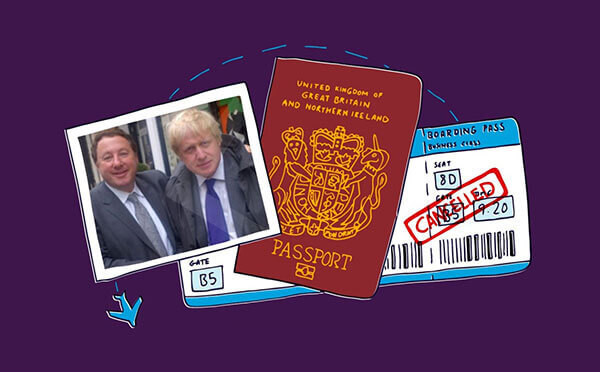
Dear Prime Minister,
You need to close airports now.
It’s not enough to say they may close in future. People from infected countries are still flying into the UK, increasing the risk of a second wave of COVID-19.
The decision to keep airports open throughout this pandemic has put the nation at risk. I’m sure that you had your reasons – even though we are one of the only countries in the world to have done so.
Perhaps, amidst the threat of recession and the uncertainty of Brexit, closing borders entirely seemed foolhardy? Whatever the motive, you need to change course now.
The situation in airports is extremely dangerous. I, like many people, am shocked by the absence of any health checks for incoming visitors. Airport staff have only recently been issued with any kind of protective masks or clothing. Many UK airports aren’t asking for those travelling to wear masks or gloves. How can this be?
The new two-week quarantine for new arrivals to the UK seems to be entirely optional. Other nations have taken a different stance. In Israel, incoming travellers are quarantined in an airport hotel for two weeks, confined to their room, and brought three meals a day, to protect the local people from infection.
Right now, the infection rate has dropped significantly in many cities across the UK. This has only been achieved through massive sacrifices on behalf of the British people, who have stayed home, gone without seeing loved ones, and lost income – or even their entire livelihoods – to reduce the spread of the virus. Lockdown will have been for nothing if there is a second wave.
At Heathrow alone, there are still 60 flights landing daily. This is just 10% of the usual number but still means that hundreds of people are arriving in Britain – many from countries that are still battling the virus. It is estimated that 42,000 people from overseas have flown into the UK since the pandemic started; this figure excludes the 53,000 British nationals flying home.
We are an island nation. This has been a huge advantage over the years, ensuring our survival during World War II. Why aren’t we closing borders now?
I understand that airlines have been badly hit by this crisis. Surely a handful of passengers won’t make much difference? These companies are generating more income from using the airplanes for freight at the moment, so why not stop all passenger travel?
The economy is so fragile. Seven out of 10 British firms have furloughed staff. Pay is falling fast for those in work. Many people are facing a jobless future as growth stalls in most businesses. A second round of infection will do extreme damage. Not just to our economic prospects but also to our national spirit. It will be so much harder to come back from a second wave.
Please do the right thing, Prime Minister. Shut the airports.
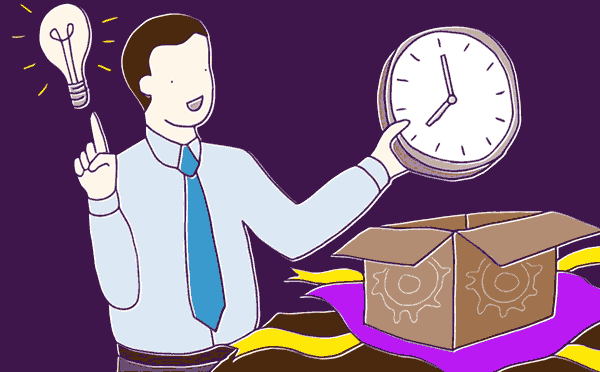
There are advantages and disadvantages to this ‘new normal’. It’s easy to focus on the negative: last week, I admit that I felt a bit lost.
I’m used to roving the shop floor, looking for areas where we can make improvements. I’m a ‘face to face’ leader, and I like chatting through ideas with my team and visiting customers. It’s taken some time to adjust to web meetings and working in the virtual world.
But now that I’m in the swing of remote working, I’m starting to see some major benefits. I’m no longer working from the office, which means I’m saving an hour a day in travel time. That’s an extra five hours a week – a major bonus.
Being based at home seems to save time in so many ways, because everything you need is all in one place and there are no distractions. Even if lockdown lifts in two weeks’ time, my family will stay in isolation for 12 weeks. My son has asthma, putting him in the ‘at risk’ category, so we are taking every precaution.
I’ve found myself with more free time than I have in years and I’m determined to make the most of this opportunity. I believe that we need to constantly look for ways to improve – not just our businesses but ourselves. If you stop trying to be better, you lose your edge.
I’ve been focusing my attention on creating special projects that will ensure BigChange is even more efficient and lean when the recovery comes around. I’ve been looking at improving service levels, enhancing the way teams work together, and finding any gaps in the organisation that need filling. I’ve never had the time to look at these areas in fine detail before and it’s been a revelation.
I’ll be honest with you. At BigChange, we are expecting to see some slowdown in sales as prospective customers hunker down and wait for this uncertainty to pass. But this doesn’t mean we are sitting on our hands here. Instead, we’re investing heavily in new data warehouse architecture, moving resource into product development, and creating some new marketing initiatives to keep up a buzz about BigChange. This is a really good time to start new projects. There’s not the same amount of pressure on day-to-day operations. There is room to breathe, review, and plan.
I’ve spent many years building businesses and I’ve learned there is more than one kind of return on investment. Changes we make now could have a significant impact on the success of BigChange in the future, whether it’s brand trust, customer loyalty or employee morale.
This is also the perfect time to invest in your customers, your community and the UK business ecosystem. I have more time to spend helping others, be that through business mentoring, support for customers who want to understand BigChange’s technology better, or advice for organisations who want an entrepreneur’s take on the challenges they face.
If this sounds like you, drop me a line. I’ll do everything I can to help. I aim to support as many people and organisations as I can during this lockdown – and hopefully beyond.
This is the time to review your working day and make permanent changes. It’s a time to ditch the unhelpful habits that are holding you and your business back. This is a challenging time but it’s not all doom and gloom. Seize the opportunity.

The tragic loss of Caroline Flack and the appalling impact of Storm Dennis on families around the country have hit us all hard.
It has made me put mental health – mine, and that of my family and colleagues – at the top of my list of priorities. We never know what disaster may befall us. We never truly know what’s going on inside someone’s head. This means we must all act with kindness and compassion towards others, and try to educate ourselves about the best way to handle a mental health crisis.
When I came in last Monday, I was determined to be the best version of myself. When you run a fast-paced technology start-up, it’s easy to race around and have a myopic focus on getting the job done. I wanted to take the time to speak to my people, and to make sure every individual knows my door is always open if they need a chat.
At 9am on Mondays, I have a call with my sales team. It is usually pretty lively, fuelled by coffee and adrenaline. I admit to getting quite heated sometimes.
On this call, I promised myself I would stay calm. Who knows what people are really feeling? Who knows what might tip someone over the edge into depression or anxiety? I found myself speaking quietly, and motioning for others to lower their voices and be calm. It was a new experience and one I enjoyed.
At BigChange, we are committed to supporting those with mental health issues. We already offer access to a 24-hour counselling helpline as an employee benefit, and we pay for face-to-face therapy if required. We have switched to a 4.5-day workweek to give people more time with their families, more time to exercise, and more time for self-care. We are moving to a 4-day week in 2021.
We also recently appointed a new BigChange ambassador: Michelle Dewberry, winner of the second series of The BBC Apprentice. She is an incredible advocate for mental health awareness and has spoken to the team here about how she handled her own depression, anxiety and suicidal thoughts. We don’t want people to try and hide their mental health issues away, so having a vocal and charismatic ambassador championing this has been really powerful.
But I want to go even further.
Next Monday will be the first meeting of a new steering committee on mental health. People from all around the business will meet and share ideas, voice concerns, and talk about any pressures they face. We will take action on any issues we can fix.
We were also recently part of a mental health round-table, coming together with several other companies through Connect Yorkshire to talk best practice, and hear about each other’s initiatives. It’s amazing how much you can do at low or no cost, from creating mental health first-aiders in the business, to inviting organisations like Mind to come in and raise awareness across your company.
I’m not a specialist in mental health. Few people are. But that shouldn’t stop all of us from trying our best to be there for the people we care about, be they family, friends, or colleagues. It all starts with a willingness to change, and an open mind.

It’s the one thing that every company can do, that gives them an edge.
I am obsessed with customer service. Not just because it’s good for business but because I genuinely love my customers. I’ve never regretted a single second that I have spent making life a little easier for our users or talking about ways to improve.
I’d like to tell you a story about something that happened to me last week. It might sound like a shaggy dog tale but bear with me.
At BigChange, we use our Net Promoter Score (NPS) to understand whether we are truly bringing value to customers. It indicates a customer’s willingness to recommend your brand. Recently, we noticed one customer – who has been with BigChange for many years – had given us a neutral NPS score.
When I dug a little deeper, it turned out that they were still only using part of the system that they had signed up for over two years ago. They weren’t using all our new features and hadn’t been looking closely at the updates. This company had also taken on a new starter, who was now the main BigChange contact there. This new hire had given us the NPS score.
There was only one thing to do. I decided to go and meet him and find out how we could improve his experience of our system. The only hitch was that the company was based in Milford Haven in South West Wales.
I shan’t go into a long rant about the poor state of transport links in this part of the world – that is for another blog, about how improving the rail lines and roads would supercharge business growth in Wales. I set off at 5pm on Tuesday, naively thinking I would have a smooth journey.
I decided to get the train from Wakefield. I love to travel by train, as it gives me a chance to work. The closest I could get to my destination from here was Cardiff that evening. I have a railcard because of my hearing disability, so I got a good rate for a seat in first class. Nevertheless, the train was filthy on the Birmingham to Cardiff leg. The journey was so bumpy that it was hard to work. One particularly violent jolt sent my dinner – sushi and an entire pot of soy sauce – all over my suit. I was completely splattered.
I stayed overnight in Cardiff, as my meeting was the following morning in Milford Haven. The train from Cardiff to Swansea took an hour. From there, it was a two-hour train or a 1.5-hour taxi to Milford Haven. I was pushed for time so I flagged a cab. She told me it would cost me £150 to go 60 miles!
I negotiated her down to £100 and when we set off, she began driving at breakneck speed. When I told her to slow down, she said: “What do you expect for £100?”
She needed to stop to use a loo, so we pulled in at a truck stop. I bought us both a hot drink. She hit the gas so hard when we left that my tea ended up down my shirt.
I can’t imagine what the customer must have thought when I arrived, stained, shaken, and barely on time. He was so gracious and I found him to be extremely intelligent and knowledgeable; a real technology whizz. I spent five hours there and the session was extremely useful for me as well as him. I explained all the functionality that they hadn’t used yet, and he recommended some ways we could improve.
The Managing Director kindly dropped me at Carmarthen to get the train home. The only train I could get took three hours to get to Cardiff and then a two-hour train to Birmingham. By the time I got there, I had missed the last train home and had to stay over. I headed back the following morning, still in that dreadful suit.
You can read this story and think, ‘What a nightmare’. It’s true, that I feel like I have gone to the ends of the earth for this customer. But I mean it when I say it was an absolute pleasure. And that I would do it again, in a heartbeat. I’m really happy that I got to spend quality time with a valued user, and learn more about what we could do to help him get the most out of BigChange.
I don’t know what the trip cost me in fares and hotels (not to mention my dry-cleaning bill) but it’s worth every penny. The return on investment is enormous, if that customer feels valued.
I may be the founder and chief executive of this company but visiting customers is still the most important thing I do. If you run a company with customers all over the UK – or the world – you must be prepared to travel and meet them. Trust me, you’ll be so charged up by these sessions that you won’t care about the miles travelled or the challenges on the way.
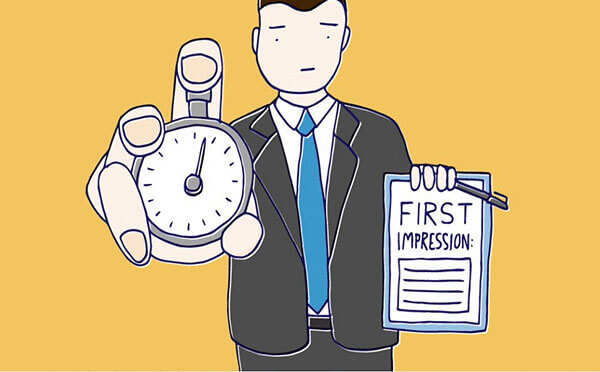
They have reached that verdict before you’ve said a word, just based on a snap judgement about your face, clothing and body language.
I was thinking about this recently, and wondering about what kind of impression I make on people when we first meet.
I should say: this didn’t come out of nowhere. A colleague I know and like recently described me as ‘mercurial’. This isn’t a word you come across every day, so it stuck with me.
There are two interpretations of ‘mercurial’, according to the dictionary. One is “often changing or reacting in a way that is unexpected” and the other is “lively and quick”. I have a feeling this person meant the former…
I don’t want to come across as inconsistent or make people feel they don’t know where they are with me, so I began talking to people around me to gauge their impressions about me.
This isn’t just me being self-indulgent. I genuinely want to know how I come across. I also believe that by sharing these observations in this blog, people will know what to expect when they meet me. And perhaps this will make it easier for us to get along.
I first spoke to Jane, who is an incredible event organiser, and works for BigChange. She laughed at the question but said that I wasn’t changeable or inconsistent – thanks, Jane – but that she can understand why someone would say that. Oh. Great.
“You carry a lot of information in your head,”
she explained.
“You’re dyslexic, so you don’t write anything down. Instead, you’re constantly making mental lists.”
“It’s a lot to process, and you jump from topic to topic quite quickly. It can be hard to follow but I’m dyslexic too, so I totally get it.”
“It means that you are unpredictable in that you never know what you will say next but, as a person, you are far from unpredictable. You are consistent in everything you do.”
Andrew, our commercial whizz, pulled no punches.
“You can shout and scream one minute and be completely calm the next. You’re the kind of person that will immediately verbalise any anger or disappointment but will not hold grudges. Once that moment has passed, you will be absolutely fine. Some people find this hard to handle.”
I think in entrepreneur circles, we call this “passion”. Joking aside, I can see that this might be hard to process if you don’t know me well.
It wasn’t all bad. Andrew also said:
“You are a very good person to work with. You are extremely commercially savvy and understand people very well. Although you can be tough to work for and do expect perfection and zero mistakes, you are also an incredibly kind boss. There are countless times I’ve seen you go over and above what any other employer would do for your team. If somebody is unwell or having a personal problem, you will do everything in your power to resolve it for them – even if it’s at your own expense.”
Charlie, who works in sales, thought I was having him on when I asked him to:
“be honest. Tell me what you really think.”
He was diplomatic, as you would expect from someone who is customer facing and negotiates every day. He called me “unique”, which I think means I’m not your typical boss (which could be good, or bad).
“You are hard working, an entrepreneur, a tough taskmaster, full of confidence and very positive,”
he said. All true.
But when I asked how his impression of me has changed over time, he surprised me.
“I think the main thing I’ve learned that I didn’t know from the off was that you are a generous family man and loyal to your colleagues.”
So there you have it. If we haven’t met yet but are likely to in future, be prepared. I may have a different approach, my thought processes may be a little chaotic, I am an emotional man, but take the time to get to know me and – hopefully – you’ll see that it was worth spending more than one-tenth of a second to make up your mind. Or maybe I’m just mercurial after all.
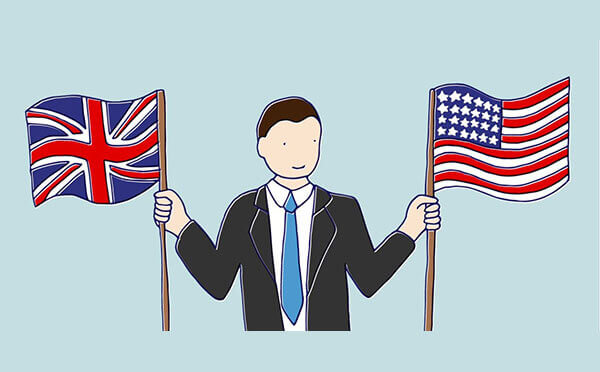
I’m writing this from a hotel room. It’s pitch black outside and my phone keeps buzzing with emails from the UK.
There’s no way I’m going back to sleep so I’ve decided to use the time wisely: to write about my experiences expanding into overseas markets.
There are a lot of tips out there for entrepreneurs expanding beyond their home borders. The usual ones include things like, ‘Always get on a plane’ – I get on lots of planes. They also tell you to expect cultural difference and it’s true, one size does not fit all when it comes to rolling out a product or service globally.
But there is one all-important point that never seems to get a mention. You must – and I mean must – make sure that all the process and best practice that you have painstakingly built up in your domestic market is transferred to new territories. Otherwise all is lost.
That’s one of the reasons I’m in the States. BigChange is planning on making major inroads here and we already have a couple of customers. I want to make sure that our nascent business is following the processes and brand guidelines that I’ve put in place in the UK.
It’s critical for a couple of reasons. First, is the Net Promoter Score. This is the holy grail for modern companies. For anyone who is unfamiliar with the NPS, it’s an index that ranges from -100 to 100, and indicates a customer’s willingness to recommend your brand to others. It’s source of enormous pride for me that BigChange has a score of 60 in Q3, which means we offer outstanding customer service.
It’s easy for customer service to be eroded by expansion. Too often, companies chase new business without thinking of what kind of experience those new customers will have. Everyone must follow our rules, with no exceptions. Especially when it comes to RoadCrew – our customer service function. This impacts everything from how we interact with customers, to how queries are handled, and the speed of our response.
One of our best routes to market out here is through existing customers; they will help us make connections through their networks. That means we have to be doing a brilliant job, consistently.
The second reason that process is critical is because it maintains efficiency. When you are building a business that is based on automation, you need to follow the rules or else new layers of complexity somehow find their way into the system. Rules can be reviewed and updated regularly but, ultimately, they are sacrosanct.
Luckily, we use our own JobWatch software, which allows us to bake in the processes that we want followed and to check that every ‘i’ has been dotted and ‘t’ crossed. We are expanding both through proprietary sales and through resellers and distributors, so without checks in place it would be easy to lose control.
These are the things I think about when I can’t sleep, and I’m far from home. At least it stops me thinking about the Election tomorrow.
Got any unusual tips on expanding overseas? I’d love to hear them. Please share them in the comments below.